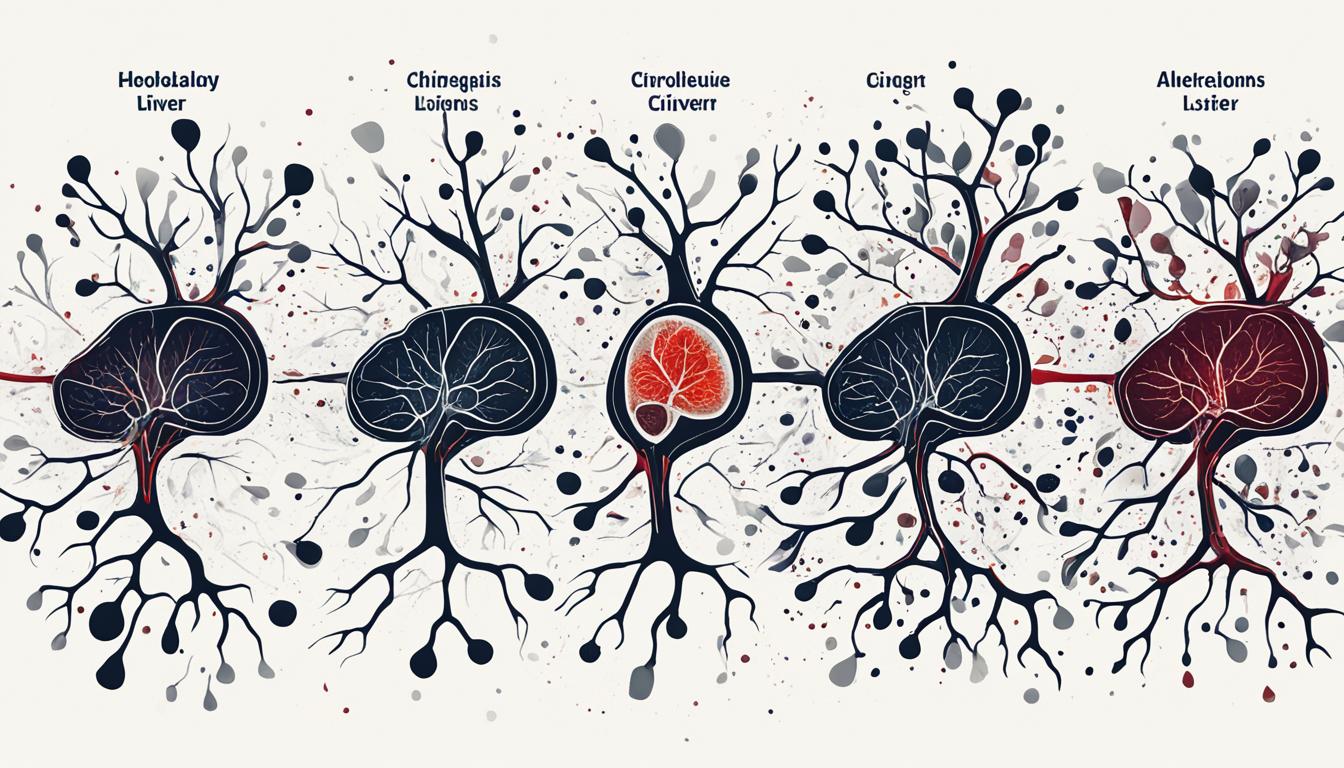Alcoholic hepatic cirrhosis causes over 30% of liver disease deaths around the world. It’s a serious condition related to liver damage from too much alcohol. This shows how important it is to know about the link between drinking and liver health.
This liver problem is mainly due to drinking too much alcohol. It greatly harms the liver, leading to cirrhosis. Understanding this can help people think about their drinking habits. It can also help them take steps to keep their liver healthy.
We will look at how drinking a lot can damage the liver. This will show us why it’s crucial to know about the connection between alcohol and liver disease. And why preventing it is key.
Let’s learn about the serious impact of alcohol on the liver. This will help us see why preventing liver damage is so vital.
Key Takeaways:
- Alcoholic hepatic cirrhosis is responsible for over 30% of liver disease deaths globally.
- Too much alcohol is the main reason behind alcoholic hepatic cirrhosis.
- Knowing the reasons for this condition is vital in stopping and controlling it.
- Understanding these reasons can help people choose wisely about drinking. They can also protect their liver health.
- Preventing is important to lower the risk of alcoholic hepatic cirrhosis.
Recognizing Cirrhosis Symptoms
In this section, we highlight the signs of alcoholic hepatic cirrhosis. It’s vital to spot these early to get help and better your chances. Signs of cirrhosis can differ. But some usual symptoms are:
- Jaundice: It shows as yellow skin and eyes. The liver can’t handle bilirubin right, a waste from broken red cells.
- Fatigue: Feeling tired and weak a lot is common. This happens because the liver can’t store or use energy normally.
- Abdominal Swelling: Fluid builds up in the belly, causing it to swell and feel uncomfortable.
- Easy Bruising and Bleeding: With the liver not working well, blood may not clot right. This leads to more bruises or longer bleed times.
- Loss of Appetite and Weight Loss: The body may not absorb nutrients like it should. This causes you not to feel hungry and lose weight.
- Mental Confusion: With time, cirrhosis can affect your brain. You might feel confused, struggle to concentrate, or have memory problems.
- Spider-like Blood Vessels: Dilated blood vessels, called spider angiomas, can show up on your skin.
These are usual cirrhosis signs. Yet, someone might have more or different symptoms. It’s key to see a doctor for a clear check and correct treatment.
“Recognizing the symptoms of alcoholic hepatic cirrhosis enables early intervention and improved outcomes.” – Dr. Sarah Thompson
To see the symptoms visually, look at the table below:
| Symptom | Description |
|---|---|
| Jaundice | Yellowing of the skin and eyes due to impaired liver function |
| Fatigue | Persistent weakness and lack of energy |
| Abdominal Swelling | Fluid accumulation in the abdomen, causing bloating and discomfort |
| Easy Bruising and Bleeding | Increased susceptibility to bruising and prolonged bleeding |
| Loss of Appetite and Weight Loss | Reduced desire to eat and unintentional weight loss |
| Mental Confusion | Difficulty concentrating, memory problems, and confusion |
| Spider-like Blood Vessels | Dilated blood vessels visible on the skin |
If you notice any of these signs, don’t wait. Seek medical help quickly. Early diagnosis and treatment are very important.
Diagnosis and Liver Function Tests
Doctors use liver function tests to diagnose alcoholic hepatic cirrhosis. These tests are key to spotting the disease and checking how serious it is. They also help figure out the health of the liver and pick the best treatment.
Cirrhosis diagnosis starts with a full look at the patient’s past health and a physical check. Doctors note symptoms and risk factors like drinking a lot over a long time. They then do specific tests to confirm cirrhosis.
The liver function tests commonly used for cirrhosis diagnosis include:
- Liver enzyme tests: These tests look at different enzymes in the blood to find liver damage. A high enzyme level, like ALT or AST, might mean cirrhosis.
- Bilirubin test: Bilirubin is a yellow substance when red blood cells die. High bilirubin levels show liver problems, a key sign of cirrhosis.
- Prothrombin time (PT) test: This test checks how fast your blood clots. Cirrhosis often makes clotting time longer because the liver can’t make needed clotting factors.
- Albumin test: The liver makes albumin, a type of protein. Low albumin could show the liver isn’t working right.
- FibroScan: A non-invasive test that checks liver stiffness. This shows how much scar tissue is in the liver. FibroScan can also track how cirrhosis changes over time.
Healthcare workers might also use other tests to check cirrhosis or what it’s doing to the liver. Imaging tests like ultrasounds, CT scans, or MRIs take detailed pictures of the liver. They can find any issues.
Understanding the Impact on Liver Health
Alcoholic hepatic cirrhosis greatly affects liver health. It’s crucial to understand the disease’s causes and effects. This knowledge helps make choices to slow the disease’s progress.
Impaired liver function is a big issue in this disease. A healthy liver is key to our well-being because it filters toxins and helps with digestion. Damage to the liver stops it from working well, causing problems for the body.
Too much alcohol is the main reason for this disease. The liver works hard to break down alcohol. But, too much can damage the liver.
The Role of Impaired Liver Function
Impaired liver function in alcoholic hepatic cirrhosis affects the body in many ways:
- Detoxification: The liver cleans harmful substances like alcohol. But with damage, it can’t clean toxins well, causing a harmful build-up.
- Protein Synthesis: The liver makes proteins the body needs. When the liver can’t work well, it affects protein levels in the body.
- Bile Production: Bile helps digest fats and is made by the liver. When the liver is damaged, not enough bile is made, causing digestion issues.
- Blood Clotting: The liver helps blood clot properly. But with damage, it can’t do this effectively, making clotting hard.
If left untreated, alcoholic hepatic cirrhosis can lead to liver failure. This is very bad for the liver.
Consequences of Impaired Liver Function
The effects of this disease are big and range from physical signs to internal health problems:
- Jaundice: A damaged liver can’t process bilirubin, causing yellow skin and eyes.
- Deterioration of Liver Tissue: Over time, the liver gets scarred and its tissue gets damaged.
- Portal Hypertension: Liver issues can lead to high blood pressure around the liver. This can cause swelling and weak veins.
- Increased Susceptibility to Infections: The liver affects the immune system, making infections more likely.
Knowing how alcoholic hepatic cirrhosis affects the liver shows why early diagnosis and care are vital. Taking care of your liver and making good choices can help your health a lot.
Treatment and Management Strategies
Alcoholic hepatic cirrhosis needs quick and smart treatment. Effective management helps a lot. It stops the disease from getting worse. Healthcare pros use different methods to help. The goal is to make the symptoms better, help the liver work well, and boost overall health.
First off, stopping alcohol with medical help is key. A plan under healthcare pro’s watch helps you quit safely. This is a must to avoid risks.
Next, drugs are big in treating liver cirrhosis. They’re chosen based on what each person needs. These drugs help with swelling, handle problems like fluid buildup, and make the liver function better.
“Medications can effectively target specific symptoms and complications associated with alcoholic hepatic cirrhosis, providing much-needed relief and improving the individual’s quality of life.”
Changing your lifestyle is also crucial. It means eating well, staying away from harmful things, working out, and keeping a good weight. These efforts guard your liver and help you feel better overall.
For really tough cases, a new liver might be the last resort. It’s a surgery that swaps a sick liver for a healthy one. But, not everyone can get this. You have to meet strict rules for it.
As a whole, the plan for alcoholic hepatic cirrhosis targets the root issues. It eases symptoms and boosts liver health. A mix of stopping alcohol safely, taking specific medicines, lifestyle changes, and sometimes, a new liver, offers the best hope. It aims to help manage the disease well and improve life quality.
Management Strategies for Alcoholic Hepatic Cirrhosis
Folks with alcoholic hepatic cirrhosis can use these strategies:
- Adhere to a strict alcohol cessation program under medical supervision
- Follow the prescribed medication regimen as directed by healthcare providers
- Adopt a balanced diet rich in fruits, vegetables, whole grains, and lean proteins
- Avoid alcohol and other substances that can strain the liver
- Engage in regular physical activity to maintain a healthy weight and improve overall well-being
- Attend regular check-ups and follow-up appointments with healthcare providers
Using these methods helps people manage their cirrhosis well. It slows disease progress and boosts life quality.
| Treatment Options | Benefits |
|---|---|
| Medically supervised alcohol withdrawal | Safely and gradually reduce alcohol consumption |
| Medications | Address symptoms, reduce inflammation, and improve liver function |
| Lifestyle modifications | Support liver health, prevent further damage, and promote overall well-being |
| Liver transplantation | Replace severely damaged liver with a healthy one from a donor (in select cases) |
Prevention and Risk Reduction
To prevent alcoholic hepatic cirrhosis, it’s important to make good lifestyle choices. This means taking proactive actions. By doing this, people can lower their chances of getting this serious liver disease. Keeping your liver healthy and drinking alcohol in moderation are crucial.
The Importance of Moderate Alcohol Consumption
It’s vital to drink alcohol moderately to avoid liver damage. Drinking too much over a long time harms the liver. It’s wise to follow the advice on how much to drink. This can safeguard your liver and keep you from suffering from cirrhosis.
“Moderate drinking” generally refers to up to one drink a day for women and up to two drinks a day for men. However, it’s important to note that individual tolerance and health conditions might require a lower or complete avoidance of alcohol.
Maintaining Liver Health
Living in a way that’s healthy for your liver is a big step to avoid cirrhosis. Here are some things to focus on:
- Eat a diet that’s well-rounded, full of fruits, vegetables, whole grains, and lean meats. Try to stay away from foods that are high in sugar, saturated fats, and processed.
- Drink plenty of water daily to help rid your body of toxins and aid your liver.
- If possible, don’t smoke. Smoking can make liver problems worse and slow down healing.
- Keep at a healthy weight by being active. Being overweight can lead to a liver disease called fatty liver, which can lead to cirrhosis.
- Avoid things that are bad for your liver, like certain chemicals. Too much contact with these can hurt your liver.
- Make sure to see your doctors often to check on your liver and handle any issues quickly.
These steps can really make a difference in keeping your liver healthy. This lowers your risk of liver disease. It’s all about taking care of yourself every day.
Promoting Liver Health
Protecting your liver means taking steps now, whether you’re diagnosed with liver disease or not. A good life strategy that includes healthy habits can boost liver health and your overall vitality.
1. Balanced Diet
A diet that’s balanced is key for liver health. You should eat lots of fruits, veggies, whole grains, lean proteins, and good fats. Try to avoid processed foods, saturated fats, and sugars, which can harm your liver. Foods high in antioxidants like berries and greens will also protect your liver.
2. Regular Exercise
Staying active doesn’t just help your body in general, it’s also good for your liver. Exercise lowers your chance of getting fatty liver disease, which can lead to more serious issues. Mix up your routine with cardio, strength, and flexibility work, but check with a doctor first.
3. Adequate Hydration
Drinking enough water is vital for keeping your liver in shape. Water helps get rid of toxins and supports your liver as it cleanses your body. Try to drink at least 8 glasses daily, and cut down on sugary drinks and alcohol.
4. Avoiding Harmful Substances
Protecting your liver means steering clear of things that can hurt it. Drinking too much alcohol is a common danger, but smoking and using illegal drugs can also harm your liver. Quit these to keep your liver safe and sound.
5. Regular Check-ups
Seeing your doctor for regular check-ups is key for a healthy liver. These visits can catch liver problems early and keep tabs on your liver’s health. If you have liver disease, these check-ups help ensure you’re getting the right care.
To keep your liver healthy, choose to live well every day. These choices can keep your liver working its best and lower the chance of serious liver diseases.

| Liver-Healthy Foods | Liver-Damaging Foods |
|---|---|
| Fruits (e.g., berries, oranges) | Processed foods |
| Vegetables (e.g., leafy greens, broccoli) | Saturated fats |
| Whole grains (e.g., oats, quinoa) | Added sugars |
| Lean proteins (e.g., chicken, fish) | Highly processed meats |
| Healthy fats (e.g., avocados, nuts) | Trans fats |
Conclusion
It’s key to know what causes alcoholic hepatic cirrhosis to fight it off. Drinking too much alcohol damages the liver. Over time, this can cause cirrhosis. If you know the signs and get help early, you can treat it.
It’s important to take care of your liver with a good lifestyle. This means less alcohol or not drinking at all. Getting help from a doctor when you stop drinking is important. They can also give you medicine and suggest changes in how you live. In really bad cases, a liver transplant might be needed.
Eating right, moving a lot, drinking enough water, and a healthy way of living help your liver. Making smart choices about your health can keep liver problems away. It also makes life better overall.




